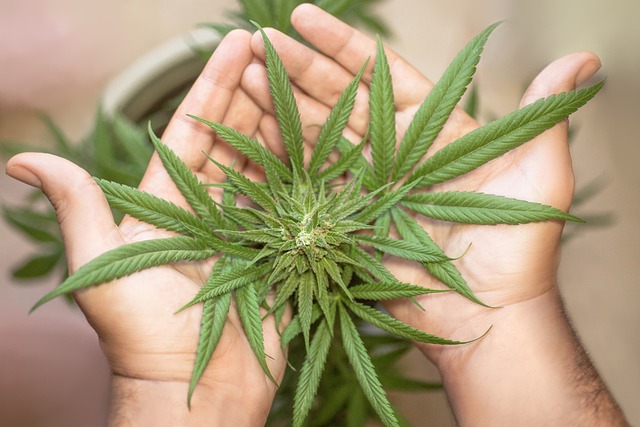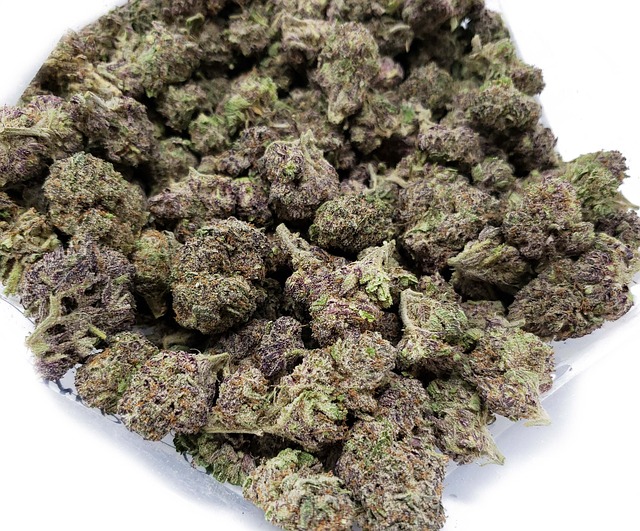2021 marked a pivotal year for California's cannabis industry with the legalization of THCA (tetrahydrocannabinolic acid), a non-psychoactive compound found in the Cannabis sativa plant. This development allowed users to explore its potential health benefits, including anti-inflammatory, neuroprotective, and analgesic effects, without the psychoactive impact of THC. The legal status of THCA in California has sparked widespread interest in its therapeutic applications, influencing other regions to consider similar regulations. THCA is recognized for its medicinal properties, particularly for managing symptoms like pain and stress, and interacts with the endocannabinoid system to influence physiological functions without altering cognitive states. In 2023, the interest in THCA continued to soar, with both enthusiasts and healthcare professionals investigating its potential for a range of conditions. As research advances, THCA is increasingly seen as an alternative treatment option, particularly post the legalization in California. Users are encouraged to consult with healthcare professionals given the evolving legal landscape and their individual health needs. The ongoing exploration of THCA's benefits underscores the importance of continued scientific investigation and responsible use within the wellness and medical sectors.
Exploring the therapeutic properties of cannabinoids has led to a growing interest in the potential benefits of THCA, or tetrahydrocannabinolic acid, particularly within California’s evolving legal landscape. This article delves into the burgeoning world of THCA flower, a non-psychoactive precursor to THC found in hemp and marijuana plants, which is gaining attention for its wellness properties. We will ‘unlock’ the potential benefits of THCA, backed by science, and guide readers through understanding its effects on health and mood. Additionally, we will cover the best practices for cultivation and consumption within legal boundaries to ensure a safe and enjoyable experience. Join us as we navigate this innovative frontier in cannabinoid wellness.
- Unlocking THCA Flower's Potential in California's Legal Landscape
- The Science Behind THCA: Benefits and Uses for Well-being
- Navigating the Effects of THCA Flowers on Health and Mood
Unlocking THCA Flower's Potential in California's Legal Landscape

2021 marked a pivotal moment for cannabis enthusiasts and researchers in California as THCA flower, the raw form of tetrahydrocannabinolic acid, was legally recognized. This non-psychoactive precursor to THC holds considerable therapeutic potential, which is now legally accessible within the state’s burgeoning cannabis market. The legalization of THCA flower in California has opened new avenues for both medical and recreational users to explore its benefits. Unlike its psychoactive counterpart, THCA does not induce a high but is being studied for its anti-inflammatory, neuroprotective, and potential pain-relieving properties. This has sparked interest among consumers looking for cannabis products with specific health applications. As California continues to shape the legal landscape of cannabis, THCA flower’s potential is being increasingly recognized and utilized, setting a precedent for other states considering similar legislation. The state’s progressive stance on cannabis research and use promises further insights into the myriad benefits of THCA flower, potentially leading to new forms of treatment and wellness options for those seeking alternatives to traditional medicine.
The Science Behind THCA: Benefits and Uses for Well-being

Cannabidiolic acid (THCA) is a non-psychoactive cannabinoid found in the Cannabis sativa plant that has garnered attention for its potential health benefits, particularly as it relates to well-being. THCA is the precursor to tetrahydrocannabinol (THC), the most well-known cannabinoid, but unlike THC, THCA does not produce a high. As research continues to evolve, studies suggest that THCA may offer various therapeutic properties, including anti-inflammatory, neuroprotective, and analgesic effects. These potential benefits have sparked interest in the extraction and utilization of THCA, especially in regions where cannabis derivatives are legal. In California, where the legal landscape for cannabis and its derivatives is well-established, THCA is celebrated for its medicinal properties without the psychoactive impact associated with THC. Users often incorporate THCA into their wellness routines to alleviate symptoms of chronic pain, inflammation, and stress, leveraging its therapeutic effects while maintaining clear-headed focus. The science behind THCA’s mechanisms involves its interaction with the body’s endocannabinoid system, which plays a crucial role in regulating various physiological processes, including mood, appetite, sleep, and pain sensation. As such, THCA flower benefits are becoming increasingly recognized for their contribution to overall well-being, making it a sought-after alternative in the health and wellness community, particularly in California where its legal status facilitates easy access and usage.
Navigating the Effects of THCA Flowers on Health and Mood

THCA, or tetrahydrocannabinolic acid, is a non-psychoactive compound found in the Cannabis sativa plant that has garnered attention for its potential therapeutic properties. As THCA legal in California paves the way for research and use, enthusiasts and health professionals are increasingly exploring its effects on health and mood. Preliminary studies suggest that THCA may offer anti-inflammatory, neuroprotective, and analgesic benefits without the psychoactive effects associated with its decarboxylated form, THC. Advocates report that THCA flowers can help alleviate pain, reduce anxiety, and improve overall mood due to their interaction with the body’s endocannabinoid system. Users often consume THCA flowers in a variety of ways, including vaporization or infusion into edibles, while maintaining legal compliance. The emerging science around THCA’s effects indicates that it may be beneficial for conditions ranging from arthritis to stress-related disorders, offering an alternative to traditional pharmaceuticals. As with any supplement or medication, it is advisable to consult with a healthcare professional before incorporating THCA flowers into one’s wellness regimen, especially given the evolving legal landscape and individual health considerations.
In conclusion, the emerging research on THCA flower has shed light on its potential benefits for well-being, offering a promising addition to health and mood management within California’s evolving legal landscape. As THCA legal status in California continues to shape consumer access and understanding of this cannabinoid, it becomes increasingly clear that further scientific exploration is warranted to fully unlock its therapeutic properties. For those interested in exploring the benefits of THCA, it’s a pivotal moment to engage with reputable sources and trusted healthcare providers to navigate its effects responsibly. The future of THCA flower holds considerable promise for contributing positively to the health and wellness of individuals within the state.
